Which Compost is Best for Your Garden? Tips for Choosing the Best Compost for Gardens
Composting is an easy and effective way to add nutrient-rich humus to your lawn or garden but it can be hard to choose which compost is best for your garden for a given application. You know the practice of applying compost can help your plants grow stronger and healthier, and it can also help improve the overall health of your soil. However, some types of compost work better than others in given use cases.
The term compost, however, covers a large number of different organic materials that can be used as soil amendments. Each of these materials has unique properties that can make them better at tackling a specific task than another type of compost. In this article, we will look at the main types of compost and the main requirements of specific common garden tasks and explain which type or types of compost are best at producing the results you want.
With so many different types of compost, so many possible use cases, and even differences in terms of stages of growth, it is impossible to single out a compost for your garden as the best. If though, you only had general-purpose finished compost you could probably achieve all the things you need to do in the garden. However, other types of compost can be much better for specific tasks and for growing specific plants so, if you want the best results possible it is advisable to use these.
What Is Compost?
Can apply to any organic material that provides nutrients to the soil through its decomposition. As we will see, in practice, this coves a wide range of materials, but we will hone in on the organic materials that are most commonly considered compost.
What Are the Various Types of Compost
There are several types of compost that can be used in your garden each with its own unique set of properties. Below we will discuss the most common types used and where they stand out as the compost to use.
General Purpose Compost
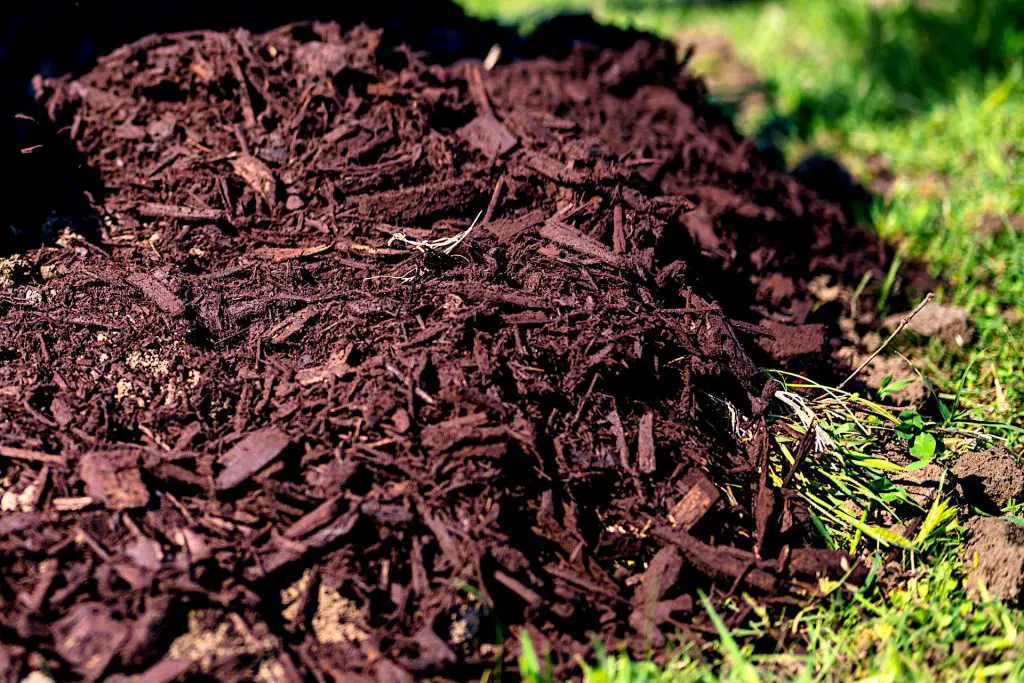
Garden compost is made from a wide range of organic materials, such as kitchen waste, garden waste, and manure. Homemade compost can be produced using traditional, hot composting, and cold composting techniques. Organic materials can also be used to produce liquid compost such as being brewed into a compost tea or compost stew.
Garden compost is not sterile, so it may contain weed spores and pathogens. This means that in its main solid form it is not the best fertilizer to use with indoor plants because of the possible transference of pathogens, fungi, and spores
What is garden compost a good choice for?:
- Adding organic matter to soil
- Adding nutrients to the soil
- Improving the soils fertility, structure and ecosystem
Mushroom Compost
Mushroom compost is a 100% natural organic product produced from the spent growing medium in which mushrooms are spawned. The growing medium is made from organic materials such as hay, straw, corn cobs, husks, and poultry or horse manure. There are many benefits to using mushroom compost in your garden.
Mushroom compost is sterile which means it is free of pathogens, fungi, and spores that can affect general-purpose compost. It structural properties help it retain moisture and when mixed into the soil it can improve drainage and aeration in your soil. It acts as a slow-release fertilizer, so it won’t burn your plants.
It does have several drawbacks, the main ones being that because it is sterile it doesn’t have the same levels of nutrients that general compost does. In addition, its elevated salt levels and its alkaline nature can cause seedlings to struggle when planted with it.
Best uses of mushroom compost in your garden:
- To improve soil drainage
- To help retain moisture in your soil
- As a slow-release fertilizer
- Can be good for raised beds and pot plants
Vermicomposting
Vermicomposting is a process whereby earthworms are used to convert organic waste into nutrient-rich compost. Unlike other methods of composting, vermicomposting does not require a bin or enclosure, making it an easy and convenient way to produce compost all year round.
The compost produced through vermicomposting is higher in nutrients than through general composting because of the addition of worm castings. The nutrient-rich material includes better levels of iron, sulfur, calcium, nitrogen, phosphorus, and potassium with an NPK of 5:5:3.
This makes vermicompost an ideal compost for poor or infertile soils and for improving the soil’s drainage capacity. Vermicompost is also easy to produce, making it a great option for those looking for an environmentally friendly and efficient way to compost their organic waste.
Best uses for compost produced through vermicomposting:
- Excellent for nutrient-poor soils with slow-release nutrients
Manure Compost
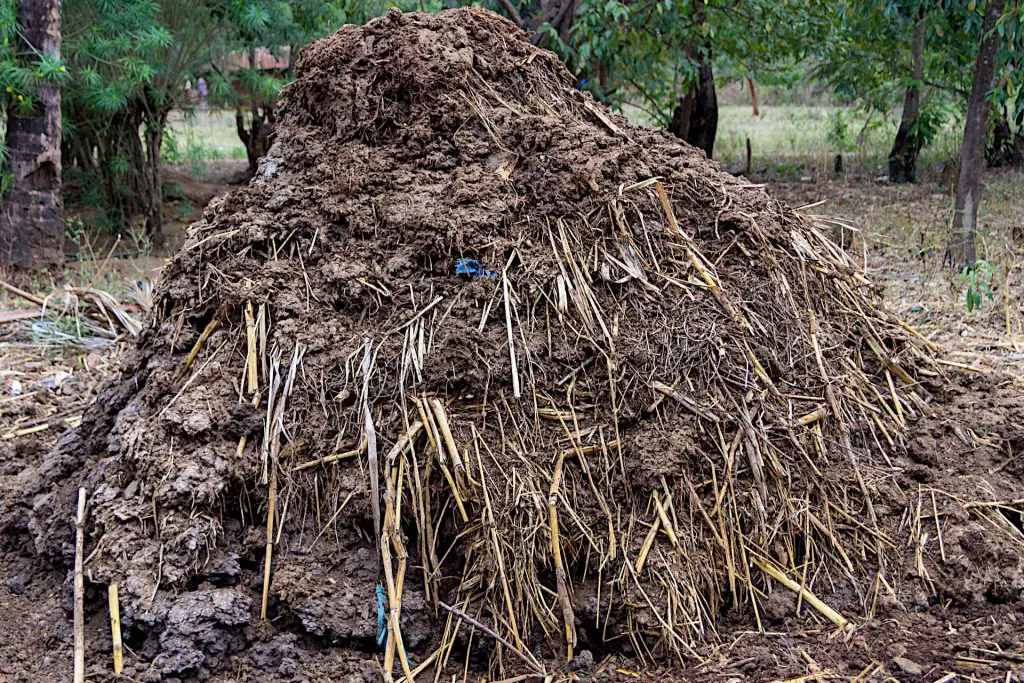
Manure compost is made from organic matter that has been digested by an animal. The most common type of manure compost is made from cow manure, but other types of manure like chicken and sheep are also regularly used.
Manure compost is high in nutrients, so it is good for adding to a garden that is lacking in them. It is also good at improving the drainage of and thus soil quality, and makes a good choice for gardens that have drainage issues.
Manure needs to be aged before use to kill off any harmful bacteria that raw manure contains. This process can take three months or more for it to be fully cured.
Manure compost is a good choice for:
- Improving the drainage of soil
- Adding nutrients quickly to soil
- Improving the fertility of a garden
Green Maure
Green manure is a key part of organic gardening and farming. It is a practice that has been used for centuries to improve soil health and fertility. Green manure crops are typically fast-growing plants that are grown and then turned back into the soil. This can be done by simply leaving the crop in the ground for an extended period or by cutting it and plowing it back into the soil.
It is considered by some to be a more environmentally friendly alternative to animal manure, although it doesn’t have the same elevated nutrient and levels of manure and it is not really a practicable process to use for small areas.
Main uses of green manure:
- Improve soil structure
- Adds nutrients to the soil
- Suitable for larger areas where you can grow and plow back into the soil
Peat Moss
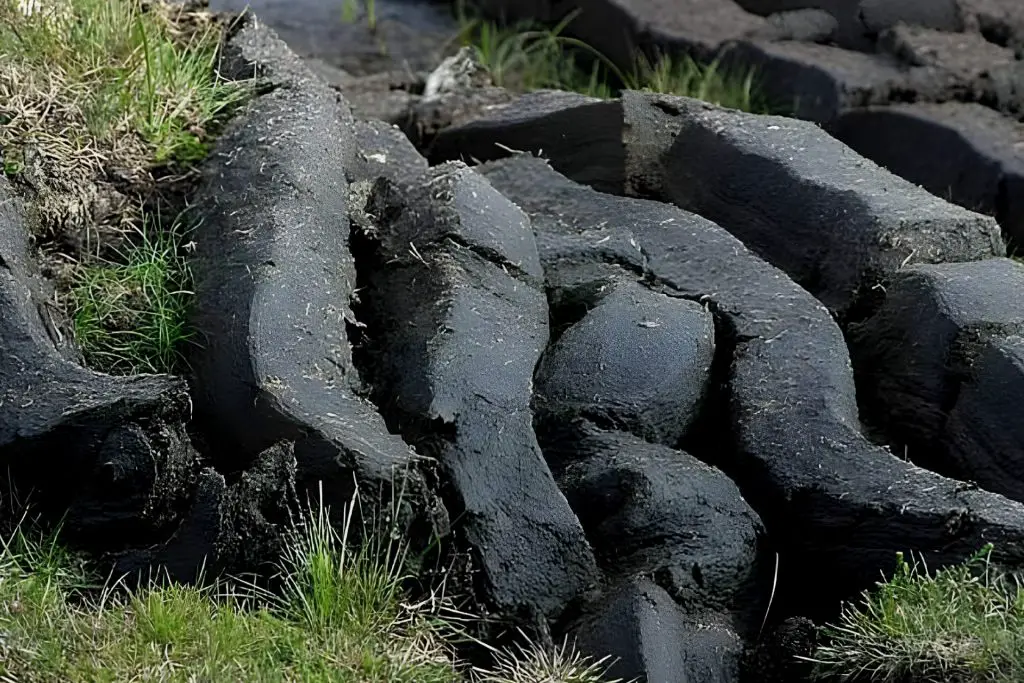
Peat moss is a natural-driven product that can help transform poor-quality soil into healthier and drainage-friendly topsoil. It is naturally sterile and particularly good at improving low-quality soil, but it is also often used within potting soil mixes to
Peat can be used as a soil amendment in that it helps improve the water and nutrient holding capacity of the soil, as well as the drainage and drainage capacity. On the flip side, peat moss doesn’t contain any natural nutrients which means it would have to be combined with other composts or fertilizers to provide the soil nutrients.
The other downside to peat moss is the environmental issues that come with using peat moss. You might find that, in some locations, its use is highly restricted or even prohibited.
Peat Moss is a great choice for:
- Improving soil structure through water retention and drainage
- Excellent for use with potted plants when additional nutrients are added
Organic Materials
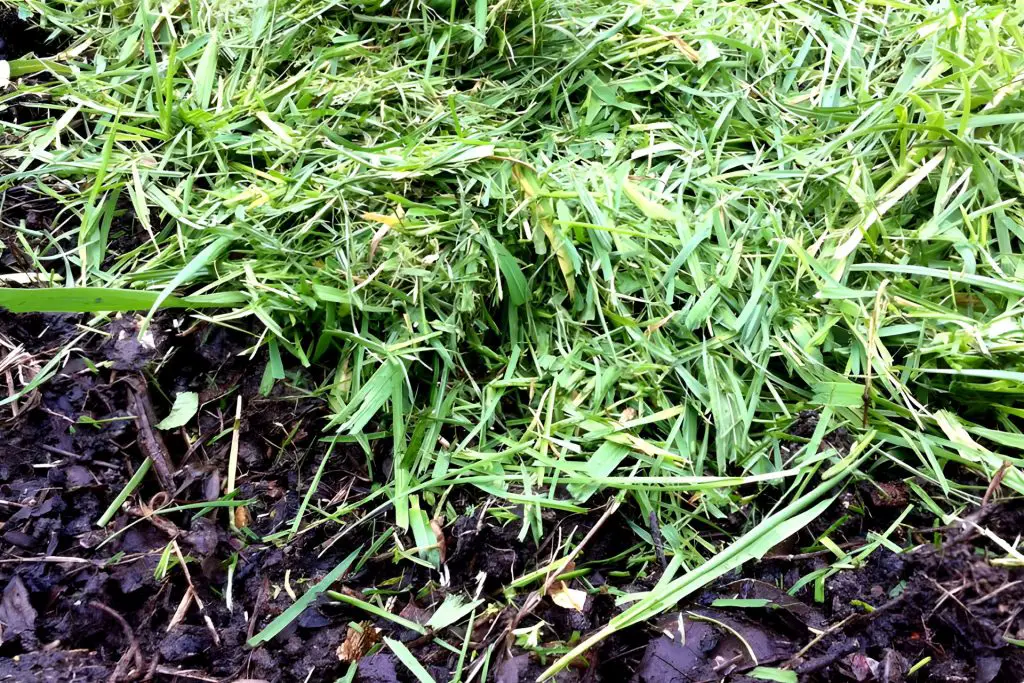
All organic materials that you can put into your compost pile can be classed as compost themselves. They differ from general-purpose compost in that general purpose compost is fully broken down into finished matured compost. Organic materials, on the other hand, when used, break down on the job, so to speak! They gradually decompose and add nutrients to the soil as they go through this process.
The most common organic materials to use in this manner are woodchips, bark, pine needles, and grass clippings. The woody organic matter is classed as brown materials, high in carbon content, and is generally used as mulches.
Fresh organic material is a great choice for:
- Wood materials are used as mulch
- Grass Clippings are used on lawns to add nitrogen
To Buy or Make Compost
The various different types of compost can be either homemade, acquired or bought. Homemade compost is general-purpose compost and can be produced by building a compost pile or using one of several other methods to produce it. Liquid composts can be produced at home as well, and both types can also be bought commercially at garden centers, nurseries, and various hardware or grocery stores.
Manure can often be acquired or bought or bought from farms, riding schools, or collected from your own animals. Manure from cows, horses, sheep, and goats needs to be aged before use. If you are concerned about the risk of contamination from fresh manure, you can always purchase manure that has been composted.
Organic material, such as woodchips, bark, and pine needles, can be bought or collected. If you have a lot of trees in your yard, or if you have a local common wooded area you should be able to collect an abundance of materials for free. You can even add spent potting soil to help bulk out your pile.
Improving Your Soil
The purpose of soil is to provide the best conditions for growing plants. A soil’s quality depends on how well the soil holds water, its nutrient content, and other beneficial substances, such as moisture and oxygen. One of the main benefits of compost is that it can improve your soil in terms of its structure and in enhancing its nutrient content. Both of these lead to better development of the underlying soil ecosystem.
Using Compost to Improve Soil Structure
There are several benefits in relation to the structure of soil that can be had by adding compost to your soil. These revolve around water retention, drainage, and aeration.
Using Compost to Increase Drainage and Aeration
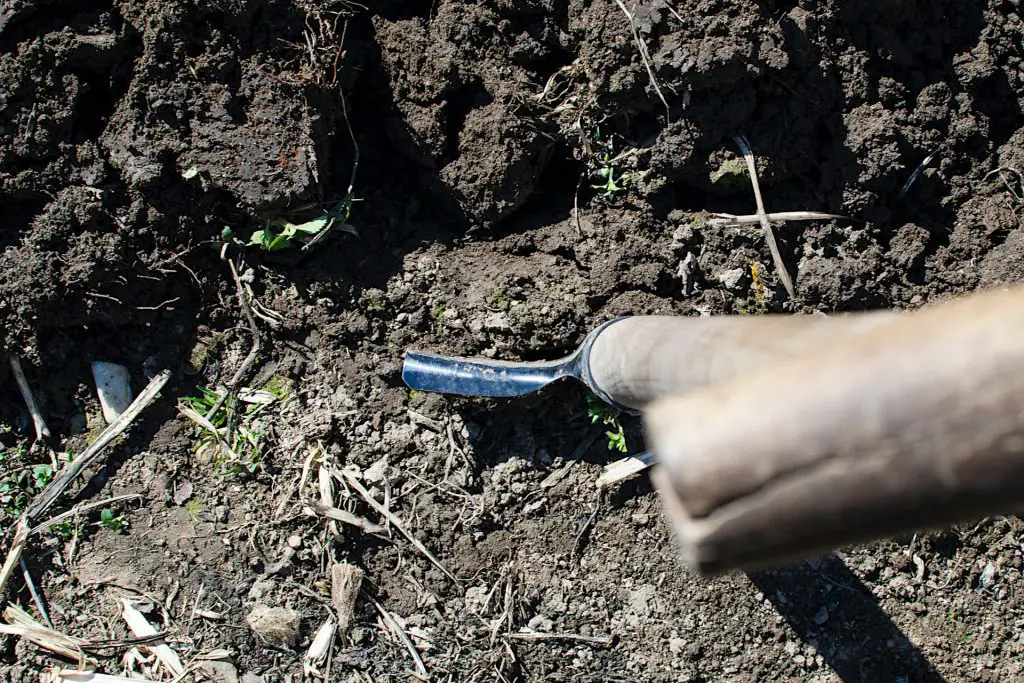
There are many different types of soil, each can have its own problems in terms of its structure. For example, clay soils have a tendency to compact causing drainage and aeration problems. Adding compost can help to improve both drainage and aeration, and can also help to loosen up compacted soils by breaking down large clumps and creating a more porous texture, which encourages better root growth.
Improving a Soils Water Retention capabilities
Other types of soil such as chalky soil can have the reverse problem, its structure being too porous to allow the soil to retain enough moisture for plants. The organic material in compost has the ability to absorb large amounts of water that roots can tap into, yet because of its composition still allow good aeration and drainage.
Using Compost to Help Combat Soil Erosion
Another area of poor soil structure with which compost can help with is soil erosion. Soil erosion is a major problem in many parts of the world. Erosion happens when the soil structure becomes so degraded that its particles can no longer combine together. The soil often becomes hydrophobic and is carried away by rain and wind.
By mixing compost into the soil you can help combat and prevent soil erosion. When compost is added to soil, it helps hold the soil together and bind the fine small soil particles together into larger clumps which reduces water runoff and increases the amount of moisture that can be absorbed by the soil
Using Compost to Improve Nutrient Content
Whilst soil contains nutrients the nutrients values in many soils are not sufficient
Adding compost to your soil is an excellent way to improve the soil’s nutrient values and to improve the soil’s structure. Compost is a valuable addition to any garden, and is an easy and effective way to improve the health of your soil.
Primary Nutrients
When you add compost to your soil, you add essential nutrients that plants need to thrive. Compost is rich in nitrogen, phosphorus, and potassium, which are essential plant nutrients. It also contains calcium and magnesium. Compost is therefore a natural source of many important soil-building materials.
Secondary Nutrients
Every plant requires three key nutrients: calcium, sulfur, and magnesium. Although they are required in relatively small quantities, these nutrients play an important role in plant metabolism and function.
Calcium helps to neutralize organic acids, which are produced during cell metabolism in plants. In addition, calcium aids in the absorption of other nutrients by roots and their translocation within the plant. Magnesium and potassium also work to neutralize organic acids.
Soil pH levels can be raised by adding lime, which is a compound containing calcium and magnesium. Commonly used liming materials include ground limestone and wood ash. These materials will improve the soil’s pH level over time.
Other Minerals
Compost contains a wide range of minerals, including manganese, iron, copper, molybdenum, zinc, and boron. These minerals are essential for plant growth and play a vital role in soil health. Adding compost to your soil will improve the nutrient values of the soil, making it more fertile and better able to support plant growth.
Applying Compost: Common Garden Use Cases
There are many different growing use cases for compost that it is impossible to cover them all, but here we have separated out the main uses and looked at the best type of compost to use in each case. However, even here different stages of growth can require changes in compost choice.
The Best Compost for Vegetable Garden
Manure is often the best choice when it comes to growing vegetables. Manure is an excellent soil amendment for vegetable gardens for a number of reasons. First, it helps improve the soil’s texture and water-holding capacity. This is important because it helps the soil retain moisture, which is essential for plant growth. Additionally, manure provides nutrients that plants need in order to grow. These nutrients include nitrogen, phosphorus, and potassium, which are all essential for plant growth.
The downside is that fresh raw manure can contain bacteria that can contaminate vegetables and cause human disease if it is not properly aged and cured. If it is cured the risk of contamination is significantly reduced as it helps to kill any harmful bacteria that may be present. In truth, you should never apply manure less than 120 days before you are due to harvest. At this point, the crop is mature enough to be able to draw enough from the soil in terms of nutrient requirements. This period also gives the crop breathing space for any lingering bacteria to die off.
Caution also needs to be shown concerning the type of vegetables grown as not all like manure. Tomatoes are a good example as they prefer lower levels of nitrogen. Other plants that struggle in manure include aubergine, peppers, and cucumbers also struggle with general-purpose compost being a better fit.
Overall, manure is an excellent fertilizer for vegetable gardens. It helps improve the soil’s texture and water-holding capacity, while also providing nutrients that plants need in order to grow.
The Right Compost For Raised Beds
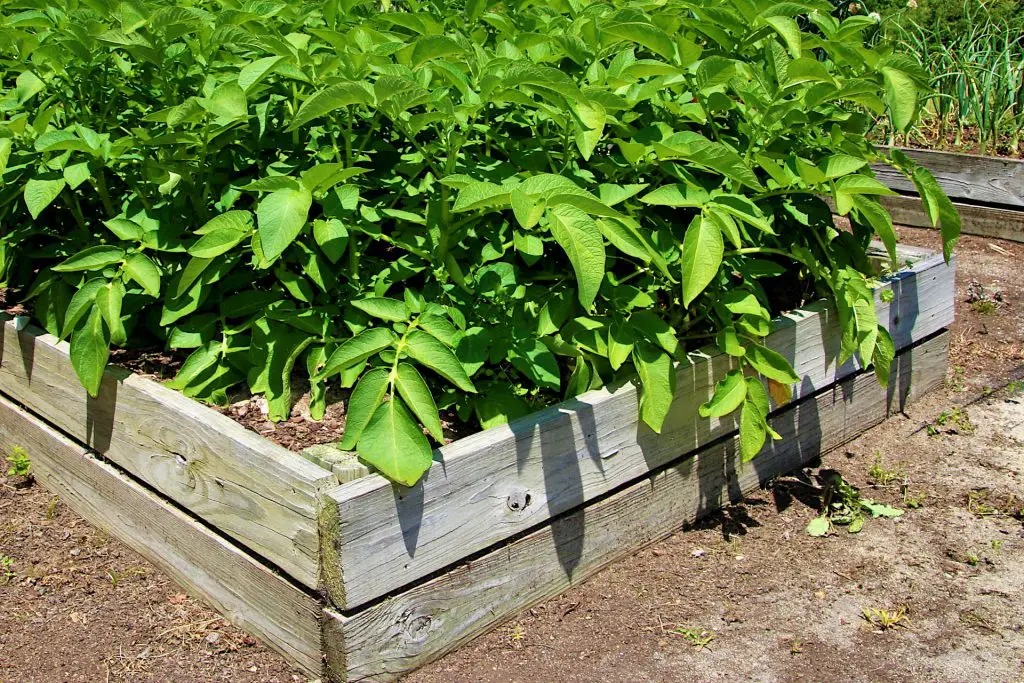
A raised bed is a large container that accommodates a planting bed that sits on top of your existing soil. It can be anywhere from just a few inches to three ft, or even higher, tall. They can be constructed from various different materials and can be flexible in shape and design.
Raised garden beds have many advantages over traditional gardening. They are easier to maintain, and they provide better drainage and aeration to the roots of your plants. The soil in a raised garden bed warms up more quickly in the spring, allowing you to get a longer planting season.
Having raised beds allows you to have more control over the growing medium in the bed. Depending on what you are looking to grow, you can use various different types of compost, each can be mixed with soil or loam to fill the beds with the most suitable substrate for your growing requirements.
Best Plants to Grow Using Manure in Raised Beds
For most plants that like fairly neutral soil, the raised bed is an excellent place to use manure. As we have noted various legumes and vegetables thrive in manure. It is also an excellent amendment for fast-growing plants such as honeysuckle, privet, and clematis. These thrive when manure is used as an amendment. This is because of the quick nutrient release manure provides.
Compost to Use in Raised Beds for growing Alkaline Loving Plants
There are some plants, such as lavender, geraniums, and dianthus amongst others, that enjoy alkaline soil. For these plants, mushroom compost makes a great amendment. It has an elevated alkaline pH and has fantastic water retention and drainage properties.
Using General Purpose Compost with Raised Beds
General compost can be used in pretty much all cases. Although other forms of compost might be slightly better at specific tasks if you only have it at hand it will still do the job. However, general compost is particularly useful because of the way that it slowly releases its nutrients meaning that you will have to apply it less often than compost such as manure.
Because of this plants that grow at more average or even slow speeds can really thrive when general-purpose compost is used as a soil amendment.
Using Compost on Lawns
A healthy lawn is achieved by maintaining proper soil fertility and adding amendments as needed. One important amendment is compost, which can be added to both new and existing lawns.
Compost as an alternative to fertilizer is a great way to improve the nutrient quality of the soil, and can be applied at any time when the ground is not frozen.
The best time to add compost is right after aerating the lawn, which will help the nutrients to penetrate the soil more easily. Overseeding is another good time to add compost, as it will improve germination and moisture retention.
If adding mature compost outside of a period where you are aerating or overseeding, it is best to sieve your compost material, so that any large pieces are taken out of the material you will use.
Best Type of Compost for Use on Your Lawn
Assuming that the underlying soil is not nutrient deficient or, in rare circumstances, has a dangerously high level of salts, the most appropriate compost is going to be general-purpose compost. It is usually not advisable to use manure on your lawn because the quick release rate of its elevated nitrogen content could easily cause your grass to burn.
Adding Grass Clippings to Your Lawn
An alternative to using mature compost is to instead add grass clippings. As we have said although you can add mature compost at any time it is most effective when you are aerating or overseeding.
Adding grass clippings to a lawn is an excellent way to improve the nutrient values of the soil base. Being an organic material, the clippings break down relatively quickly, slowly releasing nitrogen and other minerals into the ground. Regular mowing will reduce the need to collect clippings, so be sure to mow often to keep your lawn healthy and looking its best.
Cuttings, distributed thinly on soil in a hot or humid region, may decompose in four to five weeks; however, in climates with lower humidity, this can take two to three months.
Using Compost as Mulch
Mulch is any material that you use to cover the soil surface. By definition, all compost consists of organic material, but not all mulch is organic. The most popular form of mulch is wood chips or shavings, hardwood, and softwood bark. Other mulches includeleaves, pine needles, pine cones, hay, straw, coil, buckwheat hulls, and husks.
Mulch serves several important functions in the landscape. It helps to control weeds, conserve moisture, regulate soil temperature, and prevent soil erosion. It can also help to enhance the appearance of your landscape and increase the value of your home.
Which Is the Best Compost or Organic Material to Use as Mulch?
Whether you choose a mature, finished compost or fresh organic material such as woodchip, bark, or even grass clippings as your mulch should largely depend on your use case.
When to Use Mature Compost as Mulch
If you want to enhance the soil’s texture and add nutrients, you should incorporate mature compost into the top few inches of the soil in your garden. This is the best way to enrich the soil. This will result in a gradual release of nutrients, which will nourish the plants over the course of time. Additionally, adding compost will help the soil structure.
When to Use Organic Materials Such as Wood Chip and Bark as Mulch
On the other hand, if you want to minimize the number of weeds that grow and the amount of water that is required for irrigation, then you should use and add organic materials such as wood chips or bark to the top layer of the soil. This will assist to prevent weeds from growing, help the soil retain moisture for longer, and, as the organic material gradually breaks down over time, it will enhance the quality of your soil.
Summary: Which Compost is Best for Your Garden
So, which compost is best for your garden really depends on the use case. There are an enormous number of options available in terms of which compost to use, from general compost to worm compost, to aged manure to natural organic matter. Compost is a valuable addition to any garden, and is an easy and effective way to improve the health of your soil.
Generally, most composts are interchangeable, but each has areas in which they excel. Although general purpose compost can actually accomplish most tasks, be it in terms of adding soil nutrients, to improving the soil structure.
However, if you want to achieve the best growth or maximize crop yield it is advisable to go with the best compost for the job.
